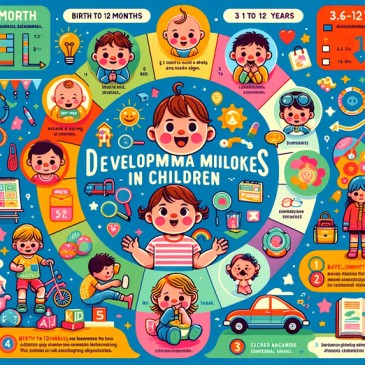Understanding Developmental Milestones in Children
Children grow and develop at their own pace, but there are certain “developmental milestones” they generally meet at specific ages. These milestones are indicators of a child’s progress in areas such as physical growth, cognitive development, emotional and social skills, and communication. Recognizing and supporting these milestones can help parents ensure their child’s development is on track.
What Are Developmental Milestones?
Developmental milestones are behaviors or physical skills seen in infants and children as they grow and develop. Rolling over, crawling, walking, and talking are all considered milestones. They provide a guide for what parents can expect to see as their child grows.
The Early Years: Birth to 3 Years
Birth to 12 Months
In the first year, babies go through rapid physical and cognitive development. They learn to focus their vision, explore with their hands and mouth, and respond to sounds and voices. Developmental milestones include smiling for the first time, sitting without support, babbling, and possibly starting to say simple words like “mama” or “dada.”
Tips for Parents:
- Engage in plenty of face-to-face time.
- Introduce colorful and textured toys to stimulate their senses.
- Talk and sing to your baby to help with language acquisition.
1 to 3 Years
Toddlers begin to walk, talk, and show independence. Recognizing emotions and playing simple games are key milestones. They also start to use sentences and follow simple instructions.
Tips for Parents:
- Encourage safe exploration and play.
- Read stories together to develop language and listening skills.
- Provide a variety of physical activities to support motor development.
Preschool Years: 3 to 5 Years
Children in this stage become more social and begin to form real friendships. They improve their communication skills, asking lots of questions, and can follow more complex instructions. Developmental milestones include riding a tricycle, using scissors, recognizing colors and shapes, and showing awareness of time.
Tips for Parents:
- Engage in creative play to stimulate imagination.
- Set routines to help them understand time management.
- Practice counting and alphabet recognition through fun activities.
School Age: 6 to 12 Years
As children enter school, they develop new skills rapidly. Reading, writing, and math skills become more advanced. Developmental milestones include improving balance and coordination, understanding complex grammar, and developing a sense of right and wrong.
Tips for Parents:
- Encourage reading for pleasure to enhance literacy skills.
- Provide opportunities for physical activity and team sports.
- Discuss moral and ethical questions to develop critical thinking.
Adolescence: 13 Years and Beyond
This stage is marked by rapid physical changes, deeper thinking, and a search for personal identity. Teenagers become more independent and begin to think about their future. Developmental milestones include developing a clearer sense of self-identity, establishing closer relationships outside the family, and setting personal goals.
Tips for Parents:
- Maintain open communication and listen without judgment.
- Encourage responsibility by allowing them to make choices and face the consequences.
- Support their interests and hobbies.
Supporting Your Child’s Development
Monitoring and Encouragement
Regularly check your child’s progress against typical developmental milestones. Celebrate their achievements and provide encouragement to help them reach new ones. If you have concerns about your child’s development, consult with a pediatrician.
The Importance of Play
Play is crucial for development. It helps children learn about the world, develop social and communication skills, and improve physical coordination.
Healthy Habits
A balanced diet, regular physical activity, and sufficient sleep are essential for healthy development. Establishing these healthy habits early can help set the foundation for a lifetime of well-being.
Conclusion
Understanding developmental milestones helps parents support their child’s growth and development. Each child is unique, and while milestones can provide a general guideline, it’s important to remember that variations are normal. Encouragement, support, and love are key to helping your child thrive.
You can book appointment on call visit clinic or online video consultations with a best child specialsit in Lahore.


